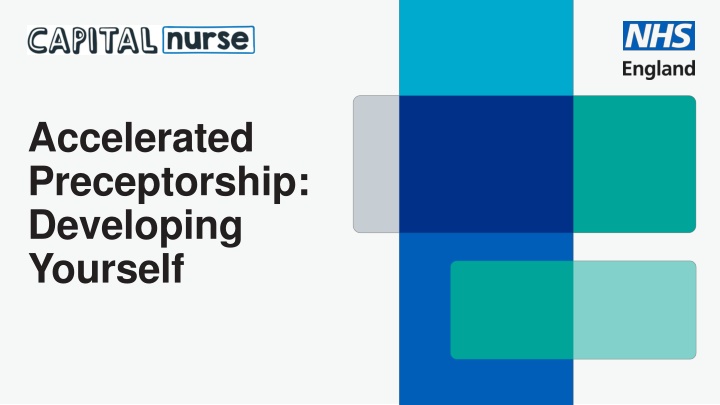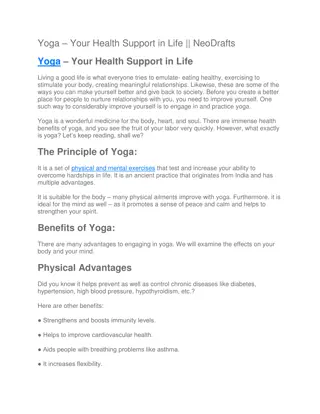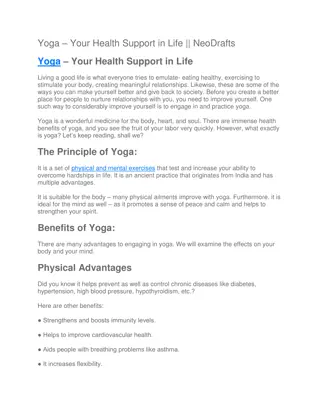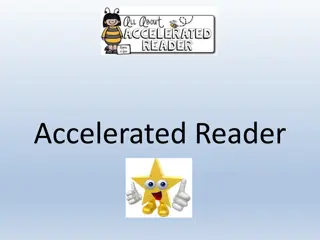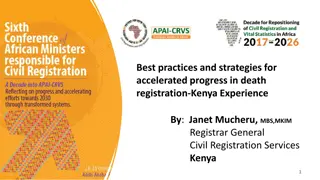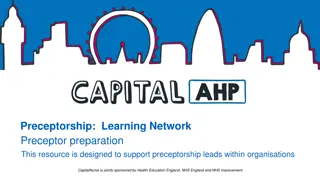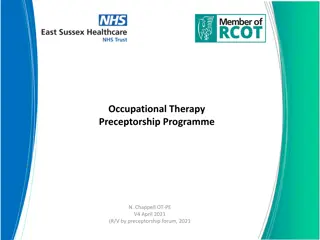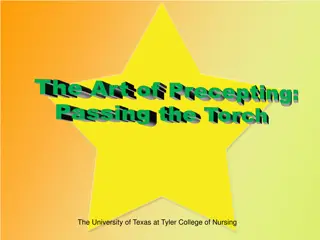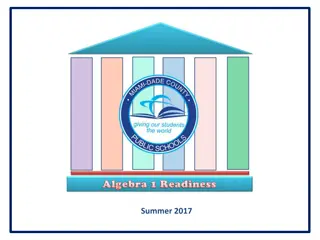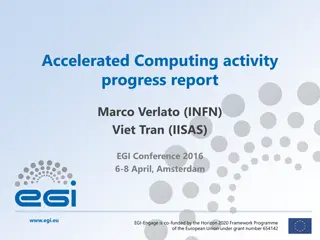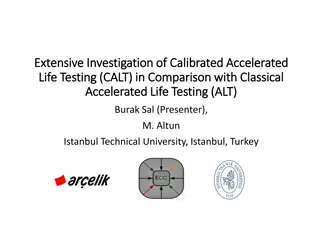Accelerated Preceptorship: Developing Yourself
Explore accelerated preceptorship by understanding the importance of self-development in personal, professional, and clinical aspects. Delve into SLOT analysis, learning cycles, and reflective tools to identify and prioritize learning needs. Enhance your skills and competence through self-awareness and proactive development.
Download Presentation

Please find below an Image/Link to download the presentation.
The content on the website is provided AS IS for your information and personal use only. It may not be sold, licensed, or shared on other websites without obtaining consent from the author.If you encounter any issues during the download, it is possible that the publisher has removed the file from their server.
You are allowed to download the files provided on this website for personal or commercial use, subject to the condition that they are used lawfully. All files are the property of their respective owners.
The content on the website is provided AS IS for your information and personal use only. It may not be sold, licensed, or shared on other websites without obtaining consent from the author.
E N D
Presentation Transcript
Accelerated Preceptorship: Developing Yourself
Session objectives By the end of the session, you will: understand a SLOT analysis understand the learning cycle and learning styles be able to set SMART objectives develop awareness of Gibbs and Rolfe et al as reflective learning tools. 2
Developing self Continued development is essential Three levels: 1. Personal developing yourself as an individual and growing in confidence 2. Professional acquiring skills in managing yourself, working with others and leadership 3. Clinical acquiring new skills, consolidating current skills and developing competence 3
SLOT SLOT analysis is a snapshot of your current level of knowledge and skill SLOTs change over time and are useful in determining learning needs: - S Strengths - L Learning Needs - O Opportunities - T Threats 4
SLOT analysis Learning needs Gaps in knowledge/skill/competence Strengths Knowledge Consolidation of skills Skills Improvement areas Experience Medicines management Specialities / areas of expertise Areas where you feel less confident Positive things you do for the team Opportunities Study days Threats Time and workload On the Job learning Funding Observation / Shadowing Appropriate opportunities Resources Attitude E-learning Lack of motivation Specialist competences Lack of support 5
Reflection Consider yourself in your new role Complete a SLOT analysis and identify your learning needs Now prioritise your learning needs: which are the two most important? 6
Kolbs learning cycle Developed by David Kolb in 1980s Four stage process of learning triggered by a concrete experience Emphasised the importance of reflection in learning Further developed by Honey and Mumford to identify four learning styles 7
Kolbs Learning cycle A new situation or experience which provokes a reaction and begins the learning experience The final stage as we test our hypothesis with a new experience or situation which incorporates our learning Concrete Experience Active Reflection experimentation The second stage during which we review our experience, think about what we have done and how we have felt Abstract During the third stage we begin to interpret and analyse the experience and develop a hypothesis conceptualisation 8
Kolb in practice At each of the four stages, ask: 1. Concrete experience what happened? When / where did it happen? What was the impact? 2. Reflection how did I react? How did I feel? How did others feel? 3. Conceptualisation what could I have done differently? Could the outcome have been changed? If so, how? 4. Active experimentation what will I do next time? What would the outcome be? How would I deal with this? 9
Kolb in practice example 1 A learning opportunity! At each of the four stages, ask: 1. Concrete experience an error has been made in medicines management and the impact was the wrong medication has been given to the patient 2. Reflection staff member felt upset and worried, second checker was annoyed, patient was understanding 3. Conceptualisation consider why it happened - short staffing, tiredness, heavy patient workload, end of busy shift, failure to concentrate. Could have checked more carefully, taken more time, checked with a senior member of staff 4. Active experimentation to prevent this happening again, make a plan at beginning of shift, write down medications carefully, follow 7Rs of medication management and check as appropriate 10
Kolb in practice example 2 A positive example! At each of the four stages, ask: 1. Concrete experience patient deteriorated normal, observations were outside normal limits and was escalated to doctors 2. Reflection staff member was concerned, wanted to advocate for patient 3. Conceptualisation action was appropriate for the situation and process was followed. If this hadn t been escalated patient would have deteriorated further 4. Active experimentation learn process of patient escalation and transfer policies to develop confidence 11
Reflection Consider a recent experience you have had and work through the four different stages of Kolb s learning cycle 12
Learning We are all individuals and learn in different ways Learning styles help us to understand our preferred ways of learning This helps us to identify which is the best method of learning for us to facilitate maximum learning and transfer to workplace Honey and Mumford identified four different learning styles Activist, Reflector, Theorist and Pragmatist 13
How do people learn? I need to find out all the facts I will try anything once! I want to think about this first Is this the best way to do this? Theorist Activist Pragmatist Reflector 14
Reflection Consider your own preferred style of learning and how this may influence your choice of development What are your preferred methods of learning? 15
Turning learning needs into objectives Prioritise learning needs Identify what needs to be done Consider preferred learning style and options Determine the timeframe Confirm the measure of success Set SMART objective 16
SMART objectives Specific clear, concise and specific Measureable how objective may be measured and what success looks like Achievable / Agreed achievable within any constraints for the individual and agreed by the individual Realistic / Relevant realistic in terms of method, timing and constraints. Relevant in terms of the individual, their learning needs and role requirements Timebound a defined deadline for completion. Whilst we may not like deadlines, we focus on achieving by a deadline 17
Example SMART objectives To complete induction and all mandatory required training documented on ESR within four weeks of joining To write one reflection on each learning activity within one week To complete HDU competencies and have all signed off by shadowing and working in HDU. Have these completed and signed off within six months 18
Reflection Refer back to the SLOT analysis you have completed and the two learning needs you identified and prioritised Set yourself two SMART objectives Don t forget: Are they specific? - How will you measure completion? - Are they achievable given opportunities and time? - Are they realistic for you in your role? - Have you identified a deadline? 19
What is Reflective Learning? Reflective learning evolves from the reflection and critical analysis of experience from professional practice It facilitates the learning process by providing a deeper understanding of yourself This means looking back on an experience or at the end of the day and thinking about what went well, what didn t go well and what you have learned Reflective learning helps us to develop and grow Reflection does not always have to be documented, you can reflect to yourself Reflecting on your shift on the way home can help take learning and prevent taking work / stress home 20
Learning to reflect Reflecting should not be onerous and need not be time-consuming. It quickly becomes automatic Reflecting with someone else for example, your preceptor, supervisor or peer, may help A reflective journal can help you to articulate your reflection and learning. It also provides a document for you to look back on and continue to learn from Using a model will help you to structure your reflections in a meaningful way Consider positive as well as negative experiences we can learn just as much from what has gone well! 21
Models of Reflection There are different models of reflection and the two most popular ones in healthcare are: Gibbs (1988) focuses on six different stages which were intended to promote deep reflection, isolating feelings and slowing down the thought processes so that reflectors avoid jumping to conclusions Rolfe et al (2001) a simple reflection model with just three questions what, so what and now what? Whilst simple, it is very effective 22
Gibbs Model Description what happened with as much detail as possible 1 How did you feel? consider emotional response, how you reacted and how others reacted to you 2 Evaluation good and bad. Consider the situation / experience, be objective and begin to make value judgements 3 Analysis and comparison. What sense can you make of the experience? Was yours the same as others? You may want to involve others 4 Conclusion what have you learned and what could you have done differently? 5 Action what will you do next time? Consider a simple action plan based on your learning 6 23
Reflection Consider a recent experience and work through Gibbs six stages of reflection Write up your reflection for your portfolio 24
Rolfe et al model WHAT: Is the problem / situation? Was my role? Was I trying to achieve? Actions did I take? Was response of others? Were the consequences? Were my feelings? Was good or bad about the experience SO WHAT? Does this teach me? Does this mean to me and to others? Could I have done differently? Knowledge or skills did I bring to the situation? Is my understanding on the situation and my actions now? Could I have done differently? NOW WHAT? Do I need to do to make things better? Broader issues need to be considered? Might the consequences be? Will I do differently next time? 25
NMC Reflection template The NMC provides a reflection template which is also a requirement for revalidation: https://www.nmc.org.uk/revalidation/requirement s/written-reflective-accounts/ 26
Reflection Now consider a different experience to the previous one and write a reflection using the Rolfe et al model Which one did you find easiest to use? 27
References Kolb, D.A. (1984). Experiential learning: experience as the source of learning and development. Englewood Cliffs, NJ: Prentice Hall Gibbs, G. (1988) Learning by Doing: A guide to teaching and learning methods. Further Education Unit, Oxford Brookes University, Oxford Rolfe, G., Freshwater, D. and Jasper, M. (2001). Critical reflection in nursing and the helping professions: a user s guide. Basingstoke: Palgrave Macmillan 28
Acknowledgments Written by Desiree Cox, CapitalNurse Preceptorship Project Manager and National Preceptorship Programme Lead, NHS England With thanks to: Hannah Fosbery, Preceptorship Lead, University College London NHS Foundation Trust Jake Chambers, Preceptorship Lead, Oxleas NHS Foundation Trust Riina Hilton, Preceptorship Lead, NELFT NHS Foundation Trust Maddy Cox, Clinical Nurse Specialist, Epsom & St Helier Jules Marchant, Therapy Practice Development Lead, Guy s and St Thomas NHS Trust, and Health Education England RePAIR Fellow Catherine DesForges, Head of Education and Development for AHPs, Royal Free London NHS Trust 29
